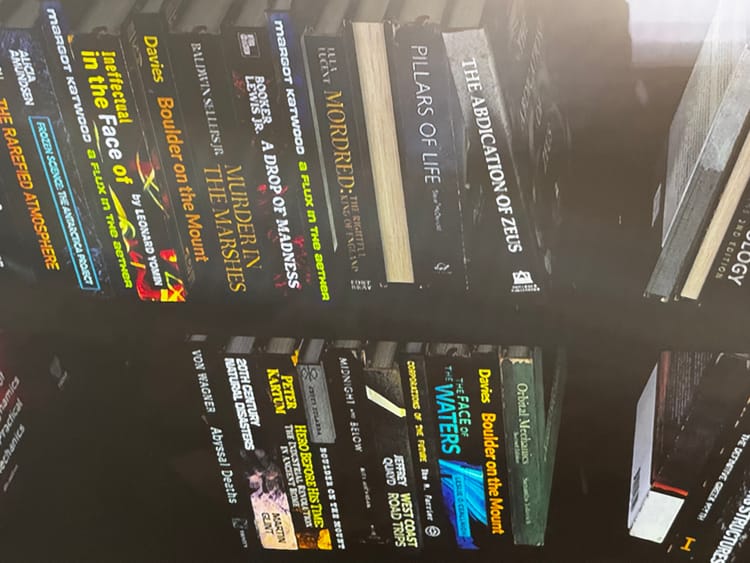Hot Crash Snow

The Educator
The Educator used to be a scientist. Still dabbles, when there’s time. But if life were a well-meaning progressive think tank run by visionaries and TED Talk darlings, the Educator’s review would read: Brilliant insights, but unwilling to play the game. Needs to network more. Needs to brand themselves.
So now they have this other job. No insights required—no games, either. Just a single principle: log on, complete the task, submit the invoice, hope the algorithm likes you. The Educator stands tall, fingers poised over the keyboard, delivering their tenth micro-task of the evening, filling in data cells about products they will never buy, summarizing articles they will never read, teaching students who will forget their name the moment the session ends. The Educator has been at this for eighteen months, which in the gig economy is a PhD’s worth of commitment.
Oh, there used to be arguments, back when knowledge had dignity. Professors, hunched and overcaffeinated, pacing their cramped offices, fighting for tenure, battling over theories, slashing each other’s papers with red ink, wielding citations like dueling pistols at dawn. People used to care about getting things right, about exploring, about truth.
Didn’t happen anymore. Education was a major industry. A managed industry. People went to SkillZ Academy for six weeks just to learn how to optimize their LinkedIn profiles, to build synergistic brands, to sculpt their résumés into SEO-friendly content marketing machines. They entered knowing nothing but emerged fluent in buzzwords. And the corporations had studied this problem. Graphed the decline of institutional research. Monitored the brain-drain from universities to content farms. Wired the early freelancers to track productivity, to optimize engagement, to quantify the unquantifiable. They sent behavioral scientists into the gig platforms, paying people ten cents per survey response to diagnose their own intellectual demise.
They collected the data: how long before a former PhD stopped citing sources? How many months before a teacher stopped correcting grammar? How many late-night contract revisions before a historian stopped reading past the headline? It took less time than anyone expected. The system sanded down the edges, filed off the depth. Knowledge became a deliverable. Thought became a commodity. And nobody argued anymore.
Professors who once agonized over ethics now sold prepackaged courses on SkillShare for $19.99, their voices flattened into the same algorithm-approved cadence. Researchers who had spent decades unraveling the mysteries of the universe now generated SEO-optimized “insights” about productivity hacks and the best time to drink coffee. Philosophers, once revered for questioning the foundations of reality, now drafted ghostwritten tweets for corporate influencers looking to build a personal brand.
There were no more debates. Just deliverables.
The Educator saw it happen in real time. The marketplace adjusted. The job listings shifted from “Adjunct Lecturer” to “Learning Content Creator.” From “Research Scientist” to “Data Labeler, Contract.” From “Historian” to “Engagement Consultant for a Major Heritage Brand.” The titles still sounded important. The pay wasn’t.
Some tried to hold out. The old guard, clinging to the idea that knowledge still mattered, that teaching was a calling, that curiosity had value. They wrote impassioned op-eds about the death of academia. No one read them. The Educator watched as they, too, gave in—one by one, setting up their Patreon pages, launching their Substacks, hawking “exclusive insights” to an audience drowning in content but starved for wisdom.
At first, the Educator resisted. They refused to dumb it down, refused to play the game. But the algorithm did not reward refusal. The algorithm wanted content. It wanted engagement. It wanted optimization.
And so the Educator adapted. Not all at once—just a small concession here, a little simplification there. Shorter sentences. Fewer citations. Less nuance. More “relatable” language. More lists. More hooks “Three Shocking Facts About Quantum Mechanics (Number Two Will Blow Your Mind!).”
The invoices got paid. The gigs kept coming. The work got easier.
One day, the Educator received an invitation to a webinar: “Reclaiming Intellectual Life in the Gig Economy.” Hosted by a former Oxford professor who now ran a brand consultancy firm. Ticket price: $199.
They closed the tab.
Another task popped up. “Write a 500-word summary on the fall of the Roman Empire, optimized for Google ranking.”
The Educator flexed their fingers. Clicked accept.
The Entertainer
The Entertainer used to be a scholar. A real one. A thinker. A builder of knowledge. She had a master’s degree in linguistics, a near-finished dissertation on code-switching in diasporic communities, a CV full of conference presentations, and a mind that could unravel the histories of words like a detective following a trail of blood through the centuries.
But academia was a door that had been slammed in her face. Over and over. One rejection letter, then another, then another, until the entire industry became an unscalable wall of unpaid adjunct gigs, crumbling tenure tracks, and grant applications that felt more like desperate lottery tickets than actual sources of funding.
She had fought it at first, applying everywhere, clawing at every opportunity, watching as lesser minds who knew the right people leapfrogged over her. Watching as “AI-generated content” started filling the gaps where real research should be. Watching as universities—temples of knowledge, or so she had once believed—pivoted to monetization schemes, corporate sponsorships, and faculty positions that went not to the best minds, but to the best brands.
Then came the debt. Then came the eviction. Then came the understanding that the world did not care about knowledge. The world wanted something else.
And so, now, she had this other job.
No syntax trees. No phonemic analysis. No late-night debates about the evolution of language. Just a single principle: the music starts, the body moves, the men pay.
She worked at Élite, a club too expensive to advertise itself, where the air was thick with perfume and money and the quiet hum of elite corruption. The men who came here—bankers, celebrities, old-money scum—wore their wealth like armor, flashing watches that cost more than her abandoned PhD program, sipping liquors older than her grandparents. They did not ask about her thoughts on sociolinguistic patterns. They did not care that she could speak five languages, or that she once had dreams of teaching, of contributing something meaningful to the world.
They only cared that she could move.
And she could.
At first, she thought she’d hate it. Thought she’d feel degraded, cheapened, reduced to something less than human. But that wasn’t what happened. What happened was something stranger: she gamified it.
The lights went down, the bass thrummed through the floor, and she slipped into a different mode of existence—like an avatar stepping into a digital world. It was a game now, a strategic exercise. NPCs with deep pockets, predictable dialogue trees. If she danced the right way, she got paid. If she smiled at the right moment, they tipped higher. If she whispered something just suggestive enough in their ears, they’d buy another bottle, book another hour.
Optimize performance. Min-max the stats. Adapt to the AI-driven economy.
The women she worked with had their own strategies. Some leaned into the fantasy, selling a dream of affection, of softness. Others played the untouchable queen, making men chase them like desperate, fumbling knights. She was something else: the glitch in the system. She never gave them what they wanted, only what they needed to keep paying.
She called it the algorithm.
They came in with their Wall Street bravado, their Midwestern oil baron arrogance, their inherited billionaire entitlement, thinking they controlled the game. But she had studied power. Had studied the way language shaped perception, the way expectation could be manipulated. She saw their tells—the subtle body shifts, the way their pupils dilated when they were hooked, the microexpressions that betrayed their loneliness, their greed, their hunger for validation.
They thought they were using her. She was using them.
But still, there were moments. Late at night, between sets, when she sat in the dressing room, peeling off fake lashes, staring at herself in the mirror, wondering if there was a way back. If this was just a detour, or if this was the end of the road.
She still read, still learned, still thought in the quiet moments. Still dreamed.
But dreams didn’t pay rent. The music started again. Time to log in.






Member discussion